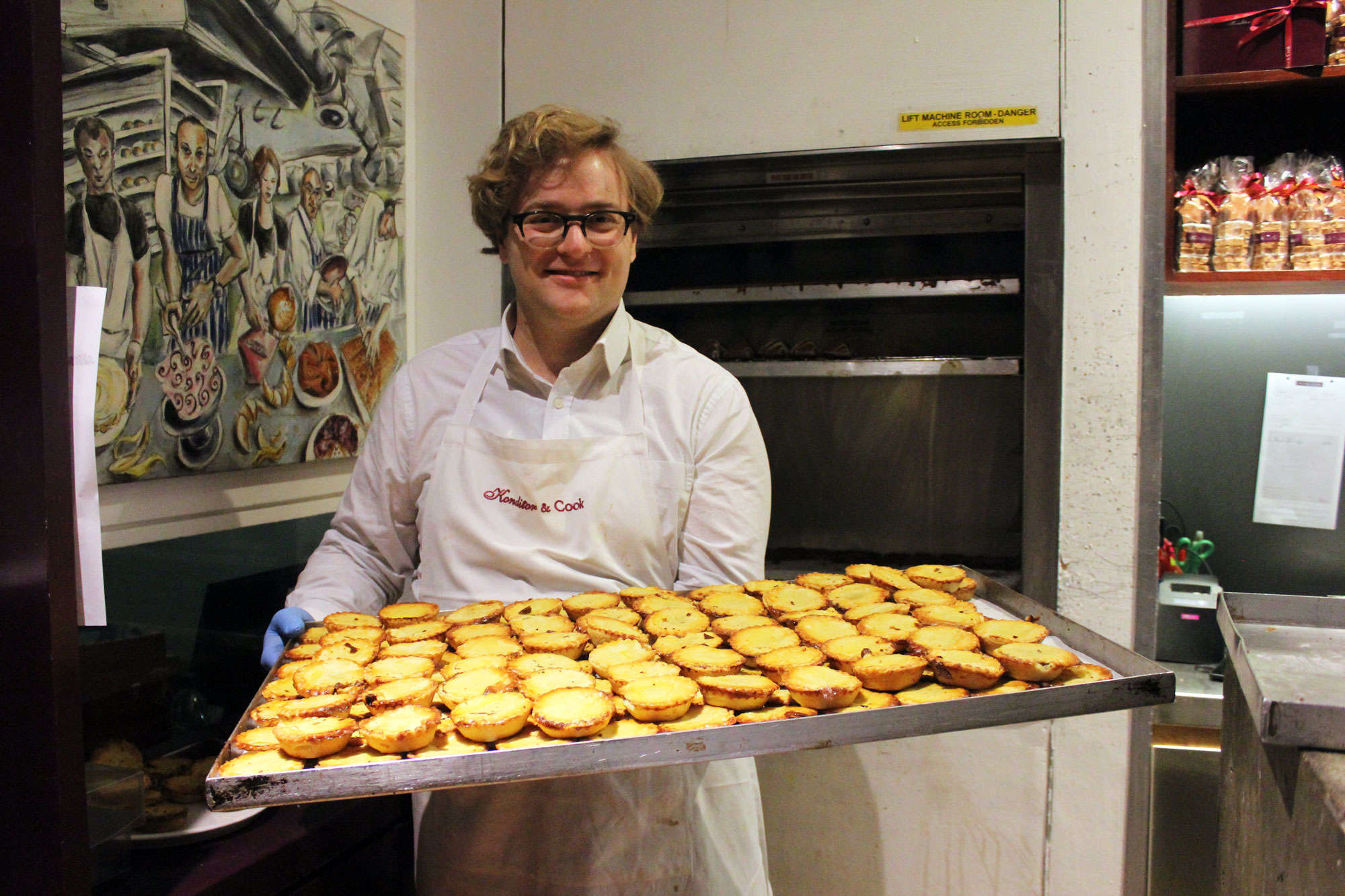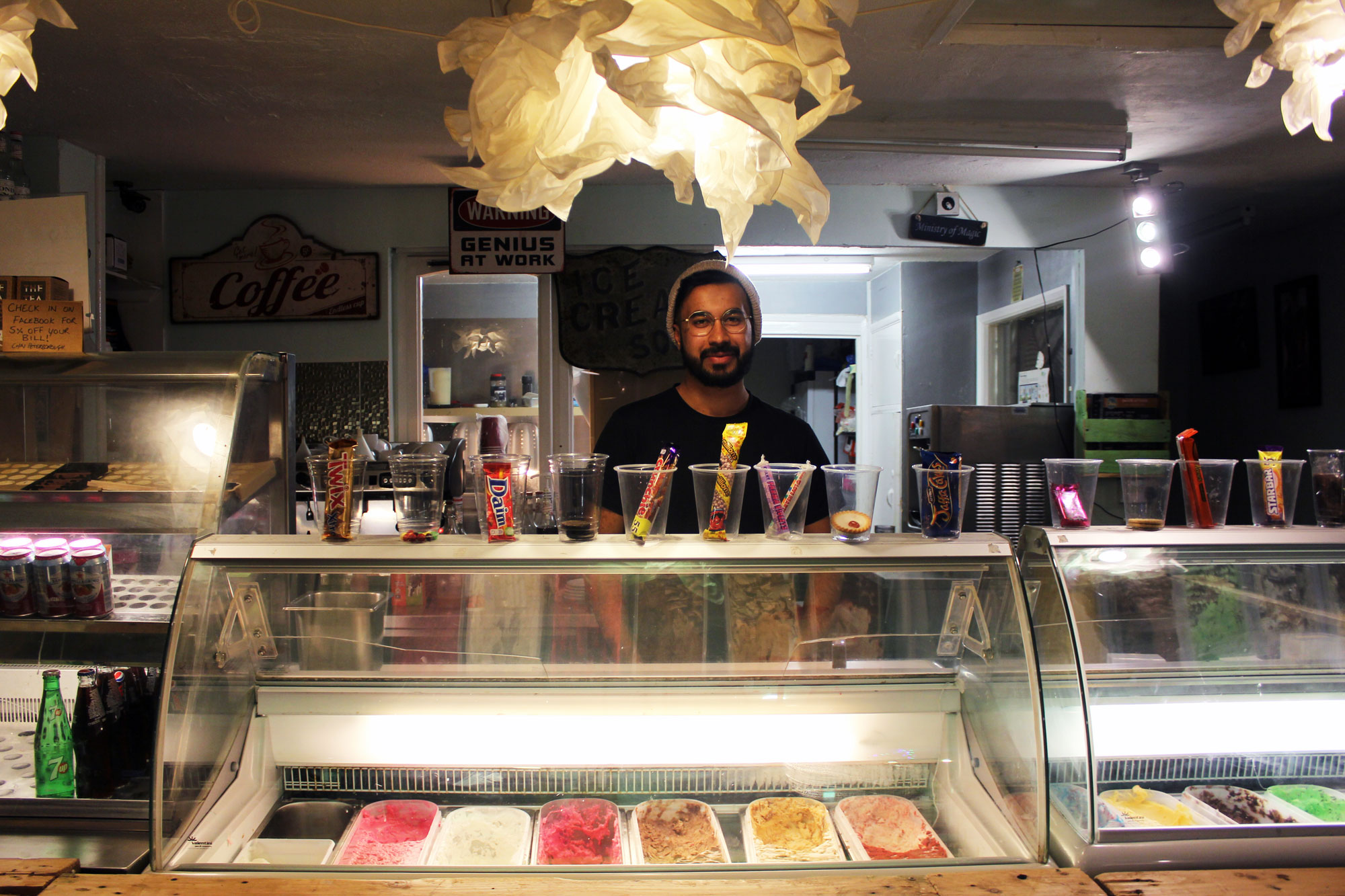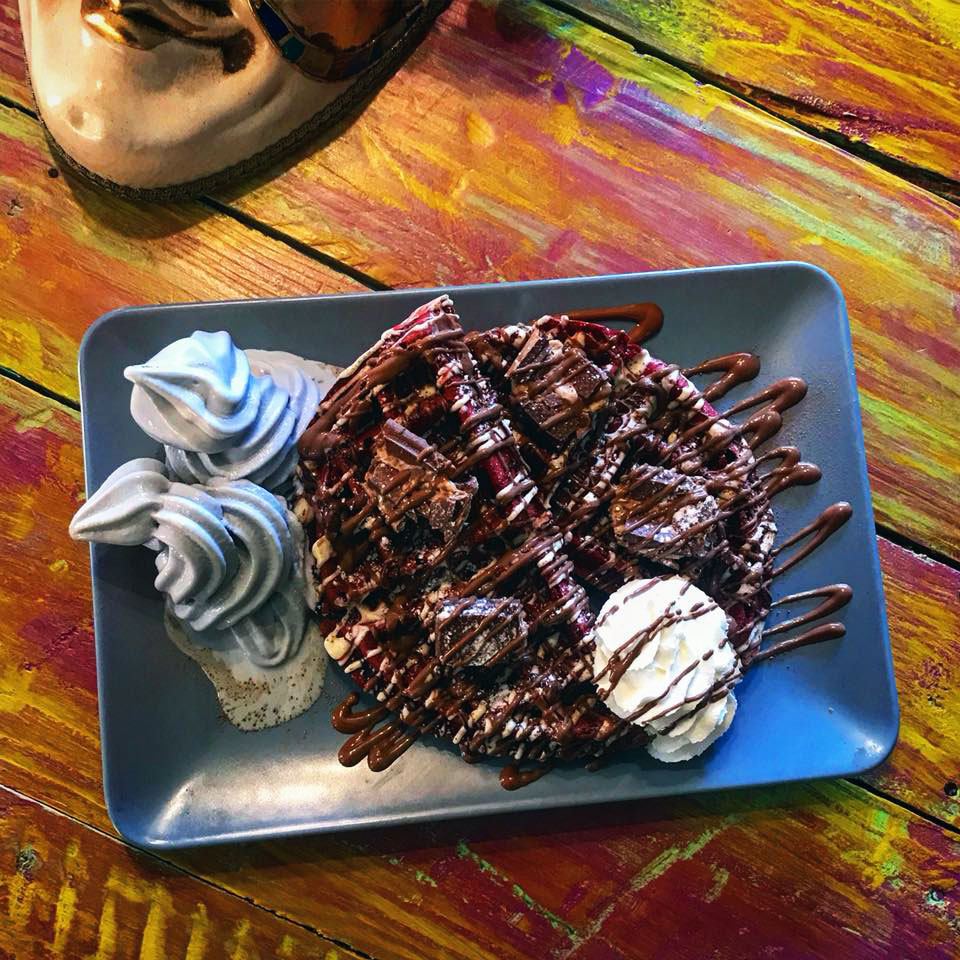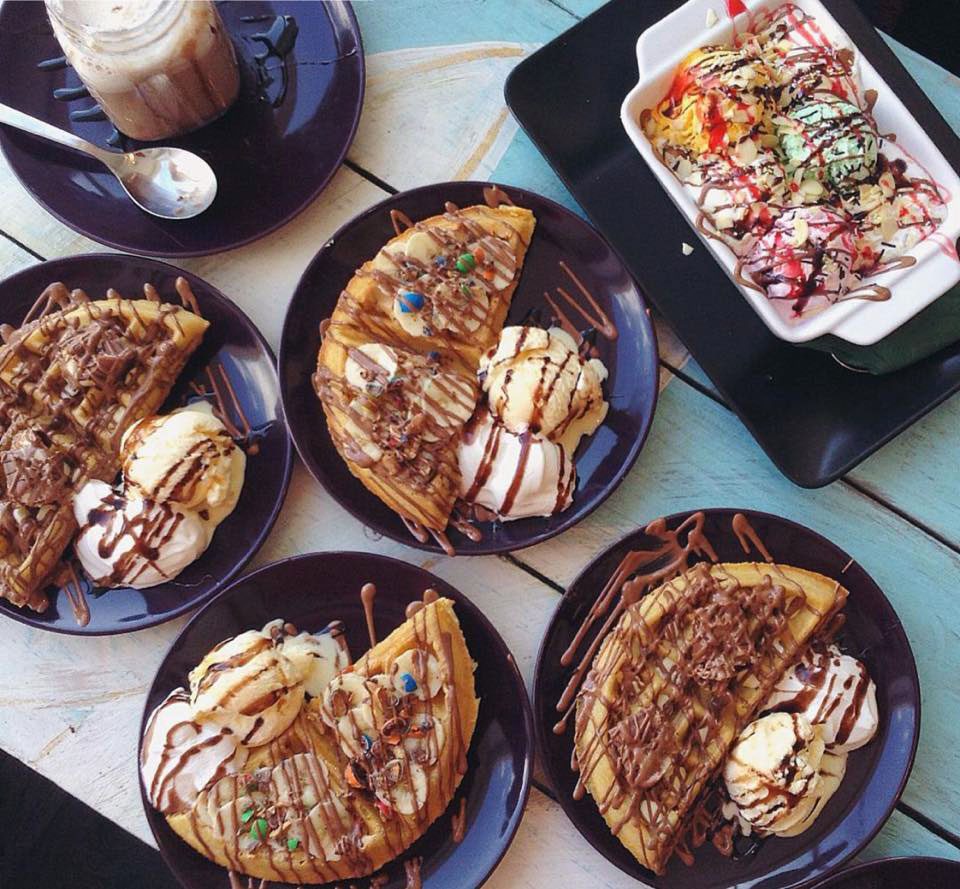I’m standing outside Ice Stone Gelato, a popular dessert restaurant on Great Horton Road in Bradford. My five-hour journey up from London, coupled with the bitterly cold Yorkshire wind, has left me in dire need of sugary warmth. Drawn inside by the bright neon lights, I’m immediately tempted by a milk chocolate chip cookie dough. As I wait to place my order, a boy runs up to the gelato display freezer beside me. He presses his hands and forehead longingly against the glass, ogling the vats of strawberry, chocolate, bubblegum, and sticky toffee-flavoured ice cream. I half expect Gene Wilder’s Willy Wonka to appear at the till, his blue eyes glistening mischievously and a top hat perched on his head as he doles out the sugar-laden dishes.
Instead, I’m greeted by a young lad with braces on his teeth.
Videos by VICE
“Hi, welcome to Icestone Gelato,” he says. “What can I get for you today?”
A decade ago, desserts were an afterthought, limited to a small section of the menu and usually involving nothing more exciting than ready-whipped cream. Today, restaurants dedicated entirely to desserts are a popular sight across the UK. Alongside outposts of Ice Stone Gelato in Bradford, Huddersfield, and Manchester; Creams Cafe dominates the South East with its American-style milkshakes and waffles and Kaspa’s, which styles itself as “a chain of exciting new dessert houses that offer the world’s favourite hot and cold desserts under one roof” has more than 30 locations around the country. The restaurant franchising—including the growing number of these dessert-only chains—now contributes £15.1 billion to the UK economy, an increase of 46 percent in the last ten years.
Ashiya Salim, an admin assistant for a Bradford theatre company, regularly brings her nieces and nephews to Ice Stone Gelato.
“If I ever have my nieces and nephews in the car, I avoid going down the road where Ice Stone Gelato is, because I know they’ll insist on going in,” she says. “When I do bring them here, they get really hyper. They love the music and they eat tonnes. As an aunty, it’s really tiring, but then it’s good to know that there will always be one place they can have fun that’s homely and family-friendly.”
To trace the origins of Britain’s dessert bar boom, you must return to the traditional bakery. Konditor & Cook is a family-run bakery and cafe that opened its first location in Waterloo in 1993, and now has six branches selling cakes and desserts across the capital. Staff here have witnessed Britain’s growing sweet tooth firsthand.

On my visit to the Konditor & Cook shop on Gray’s Inn Road, I’m greeted by white icing-covered Christmas cakes, gingerbread, and star-shaped cinnamon biscuits. Retail manager Lawrence welcomes me to the shop while attempting to balance a tray of 120 mince pies.
“We’ve sold 70,000 mince pies from November ’til now,” he says. “We’re probably looking at over a 100,000 by the end of Christmas.”
Britain’s interest in desserts owes much to BBC bakery competition show The Great British Bake Off, which first aired in 2010. Between then and 2015, when its sixth season ran, sales of sweet goods such as cookies, biscuits, muffins, cakes, and brownies rose by 9.2 percent—dubbed by some as “the Bake Off effect.” At the height of Bake Off mania, Konditor & Cook general manager Rose remembers customers coming in to buy cake that coincided with what was being featured on that week’s episode.
“One day, we would have people come in to buy four slices of cake for their friends before an episode aired so they could eat it and watch GBBO at the same time,” she says. “Then we had people asking whether we had tortes or something else they’d seen after watching an episode the next day.”
Despite Bake Off’s much criticised move to Channel 4 in 2016, annual baking sales rose last year from £523 million to £1.7 billion, prompted by a massive spike in cooking utensil purchases. It seems that Britain’s taste for baked goods endures even fierce broadcaster allegiances.
I leave Konditor & Cook with a cream cheese brownie, wrapped safely in a paper bag. A cursive script on the outside reads: “If I find myself on death row, my final meal would just be a trough full of brownies from Konditor & Cook.”
For the next stop on my sugar-saturated journey, I take a train north again to Peterborough in the East Midlands, where two brothers have opened a contemporary take on the dessert restaurant.

Chai is a furniture-shop-turned-dessert-parlour that Zain and Nabil Awan founded in 2015. Filled with homely bookshelves, wooden tables painted by local artists, and quotes from Persian poet Rumi painted on the wall, it feels like a library crossed with a Turkish coffee house.
While the brothers enjoy American-style dessert bar chains, Zain explains that they wanted Chai to offer sweet goods that also reflected their Punjabi heritage. One of the most popular items on their menu is a sticky chai tea made with organic honey and whole leaf assam. It tastes like a South Asian Butterbeer and warms me to the core.
“Growing up as a British Asian, we fused flavours all the time,” says Zain. “When we came back from school, my brother and I would slam leftover curries like chicken tikka or keema into a sandwich. We’d sprinkle a bit of cheese, put it into a toastie machine, and that was it. We wanted to reinvent the idea of a traditional dessert parlour.”

The ice cream selection at Chai is similarly South Asian-inspired, with flavours such as rose petal, Turkish delight, and a Bombay paan masala variety with fragrant cardamon and cloves.
“We also have an ice cream which comes out during summer called ‘Our Current Government,’” adds Zain, laughing. “It’s an Eton mess ice cream.”
Before opening Chai, Zain spent time studying in London and Nabil travelled to Iran and the US. When both returned to Peterborough and thought about opening a restaurant, they wanted to recreate something of the spaces they had experienced outside of their home city.
“When we launched, there was scepticism if something like this would work for Peterborough,” Zain remembers. “I’ve had people tell me that if we opened up in Camden we’d have cues out the door. But this is our hometown where we’ve grown up.”
A dessert restaurant proved to be exactly what Peterborough wanted—in the last two years, five other dessert-only eateries have been opened around the city centre. Chai has also become a community space; hosting poetry nights, Moroccan bookbinding workshops, interfaith women’s groups, and local art exhibitions.
“This popularity is, I think, driven by the general decline in pub culture,” muses Zain. “When we launched, we had a couple who came down from [nearby town] Stamford instead of going to the pub on a Saturday night. It was a nice for a change for them to come for some dessert with their family instead. I’m proud of the fact we attract people who are a bit older because traditionally, dessert parlours attract younger people.”

For 35-year-old local Anna Nayar, a dedicated vegan who visits Chai regularly for the dairy-free apple crumble, it’s all about the family atmosphere.
“I see dessert restaurants as the pub for people who don’t like pubs, such as families, people who wouldn’t go for religious reasons, and women,” she says. “When you go in to a restaurant to have savoury food, often times they’re rushing you in and rushing you out. With dessert parlours, you can go in at any time of the day and they’re usually chilled, relaxing places to be. On a snowy cold day like this in Peterborough, where else can you go to warm your cockles but Chai?”
Outside, the fast-falling snow is indeed starting to look like something out of The Day After Tomorrow. A baked marshmallow waffle drizzled with Belgian milk and white chocolate is placed in front of me as the steam rises from my chai. Nayar is right, I can struggle to think of anywhere else I’d rather be.




